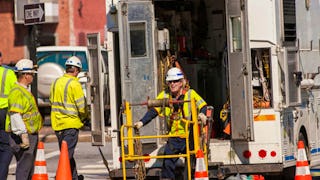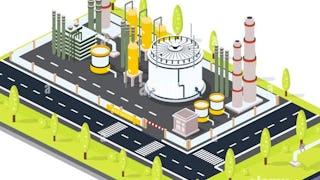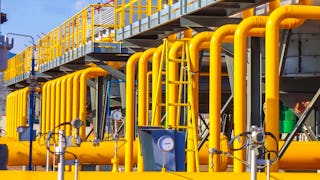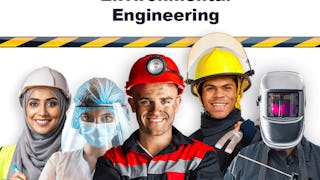This course combines essential knowledge of utilities and waste management systems with a thorough understanding of safety protocols and environmental considerations. It gives the expertise required to navigate the complex challenges of the industry while ensuring efficient operations, personnel safety and environmental sustainability.

Enjoy unlimited growth with a year of Coursera Plus for $199 (regularly $399). Save now.

Utilities, Safety & Environmental Care in Oil & Gas Industry
This course is part of Petroleum Engineering with AI Applications Specialization

Instructor: Subject Matter Expert
4,420 already enrolled
Included with
(58 reviews)
Recommended experience
Skills you'll gain
- Environment Health And Safety
- Hazard Analysis
- Environmental Engineering
- Plant Operations and Management
- Failure Mode And Effects Analysis
- Risk Analysis
- Equipment Design
- Oil and Gas
- Petroleum Industry
- Safety Standards
- Process Engineering
- Energy and Utilities
- Sustainable Technologies
- Process Control
- Environmental Regulations
- Chemical Engineering
- Waste Minimization
- Environmental Resource Management
- Electric Power Systems
Details to know

Add to your LinkedIn profile
2 assignments
See how employees at top companies are mastering in-demand skills

Build your subject-matter expertise
- Learn new concepts from industry experts
- Gain a foundational understanding of a subject or tool
- Develop job-relevant skills with hands-on projects
- Earn a shareable career certificate

There are 2 modules in this course
The module on "Utilities and Waste Management" begins with an introduction to utilities in upstream oil and gas processing, highlighting the critical role they play in supporting production and operational activities. It explores functions and applications of auxiliary equipment utilized in the industry, such as pumps, compressors and heat exchangers. It comprehends the generation of electrical power and its distribution throughout the facility. Steam generation and thermal utilities are also covered, emphasizing their significance in various processes. It delves into gas-to-liquid and gas-to-wire processes that convert natural gas into liquid fuels and electricity, respectively. The module further addresses the importance of energy efficiency and sustainability, emphasizing the need for responsible resource utilization. Instrument air and process air systems are explored, highlighting their role in providing clean and dry air for instrumentation and process requirements. Nitrogen and inert gas systems are also covered, explaining their applications in purging, pressurizing, and blanketing. Waste management is a crucial aspect of the module, focusing on the proper handling, treatment and disposal of waste generated during oil and gas operations. Water management is addressed, including the treatment and reuse of water in the industry. Finally, flare and vent systems are discussed, highlighting their role in safety and environmental protection.
What's included
14 videos1 assignment
The module on "Safety and Environmental Concerns" begins with an introduction to safety and environmental concepts, emphasizing their importance in protecting personnel, facilities and the surrounding environment. It explores basic safety concepts and considerations, giving insights into risk assessment, hazard identification, and mitigation strategies. Failure Mode Effect Analysis (FMEA) is covered in the context of oil and gas operations, enabling learners to identify potential failure modes and their consequences. Safety and hazard analysis techniques, including HAZOP (Hazard and Operability Study), HAZID (Hazard Identification) and SIMOP (Simultaneous Operations), are explored to ensure a comprehensive understanding of potential hazards and their management. Relief valves and relief systems are discussed in detail, emphasizing their role in protecting equipment and personnel from overpressure events. The module further addresses flare and vent disposal systems and their design principles, focusing on safety and environmental considerations. Learners will gain an understanding of the environmental impacts associated with oil and gas operations, including oil spills and other forms of environmental damage. Mitigation measures and the development of environmental management plans are explored to ensure sustainable and responsible practices within the industry. Environmental impact assessments are also covered, providing learners with the knowledge to assess and mitigate potential environmental risks associated with oil and gas projects.
What's included
14 videos1 assignment
Earn a career certificate
Add this credential to your LinkedIn profile, resume, or CV. Share it on social media and in your performance review.
Instructor

Offered by
Explore more from Mechanical Engineering
 Status: Free Trial
Status: Free TrialUniversity at Buffalo
 Status: Free Trial
Status: Free Trial Status: Free Trial
Status: Free TrialUniversity at Buffalo
 Status: Free Trial
Status: Free TrialKhalifa University
Why people choose Coursera for their career




Learner reviews
58 reviews
- 5 stars
81.35%
- 4 stars
13.55%
- 3 stars
0%
- 2 stars
1.69%
- 1 star
3.38%
Showing 3 of 58
Reviewed on Sep 7, 2025
Excelente curso, boa materia didactica e boa explanacao.
Reviewed on Dec 27, 2024
Provides over view of the various process, equipment etc in simple comprehensive manner
Frequently asked questions
To access the course materials, assignments and to earn a Certificate, you will need to purchase the Certificate experience when you enroll in a course. You can try a Free Trial instead, or apply for Financial Aid. The course may offer 'Full Course, No Certificate' instead. This option lets you see all course materials, submit required assessments, and get a final grade. This also means that you will not be able to purchase a Certificate experience.
When you enroll in the course, you get access to all of the courses in the Specialization, and you earn a certificate when you complete the work. Your electronic Certificate will be added to your Accomplishments page - from there, you can print your Certificate or add it to your LinkedIn profile.
Yes. In select learning programs, you can apply for financial aid or a scholarship if you can’t afford the enrollment fee. If fin aid or scholarship is available for your learning program selection, you’ll find a link to apply on the description page.
More questions
Financial aid available,





